NHS History Essay: Structure, Funding, and Ideologies from 1948 Onward
VerifiedAdded on 2023/01/17
|8
|1983
|39
Essay
AI Summary
This essay provides a comprehensive overview of the history of the National Health Service (NHS) in England, starting from its establishment in 1948. It examines the evolution of the NHS's structure, including the initial tripartite system and subsequent restructuring efforts. The essay details changes in funding models and the impact of different government ideologies, specifically those of Margaret Thatcher, Tony Blair, and David Cameron. It analyzes the reforms and policies implemented under each government, such as the introduction of internal markets, the emphasis on integrated care, and the impact of privatization. The essay highlights the challenges faced by the NHS, including financial strains, technological issues, and industrial relations. The conclusion emphasizes that the NHS has evolved significantly over time, shaped by different ideologies, and continues to be an ongoing process of reform and adaptation.
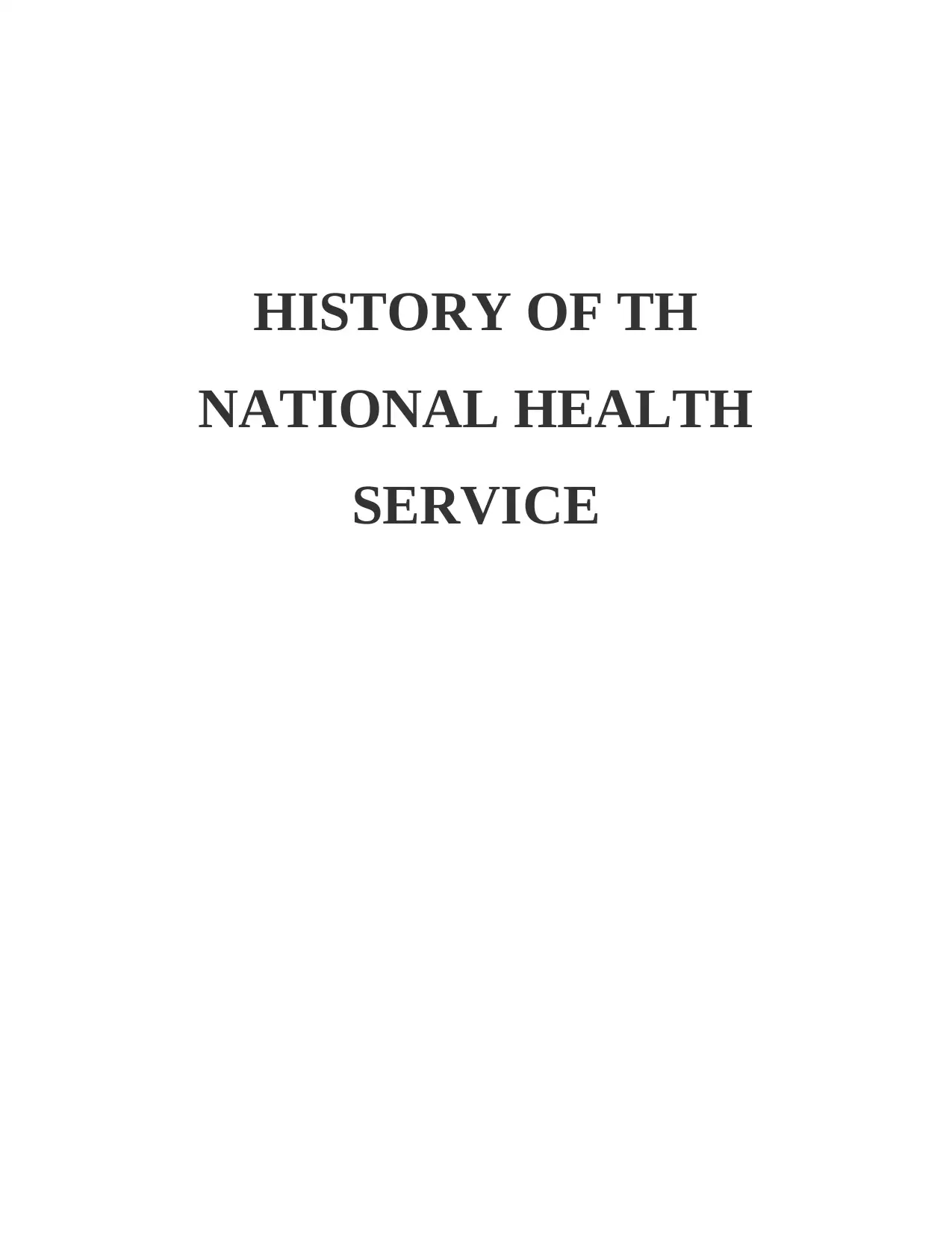
HISTORY OF TH
NATIONAL HEALTH
SERVICE
NATIONAL HEALTH
SERVICE
Paraphrase This Document
Need a fresh take? Get an instant paraphrase of this document with our AI Paraphraser

Table of Contents
INTRODUCTION...........................................................................................................................3
MAIN BODY..................................................................................................................................3
Change in structure, funding and expectations of NHS since it’s establishment in 1948...........3
Margaret Thatcher Ideology........................................................................................................3
Tony Blair Ideology.....................................................................................................................4
David Cameron Ideology.............................................................................................................5
REFERENCES................................................................................................................................1
INTRODUCTION...........................................................................................................................3
MAIN BODY..................................................................................................................................3
Change in structure, funding and expectations of NHS since it’s establishment in 1948...........3
Margaret Thatcher Ideology........................................................................................................3
Tony Blair Ideology.....................................................................................................................4
David Cameron Ideology.............................................................................................................5
REFERENCES................................................................................................................................1
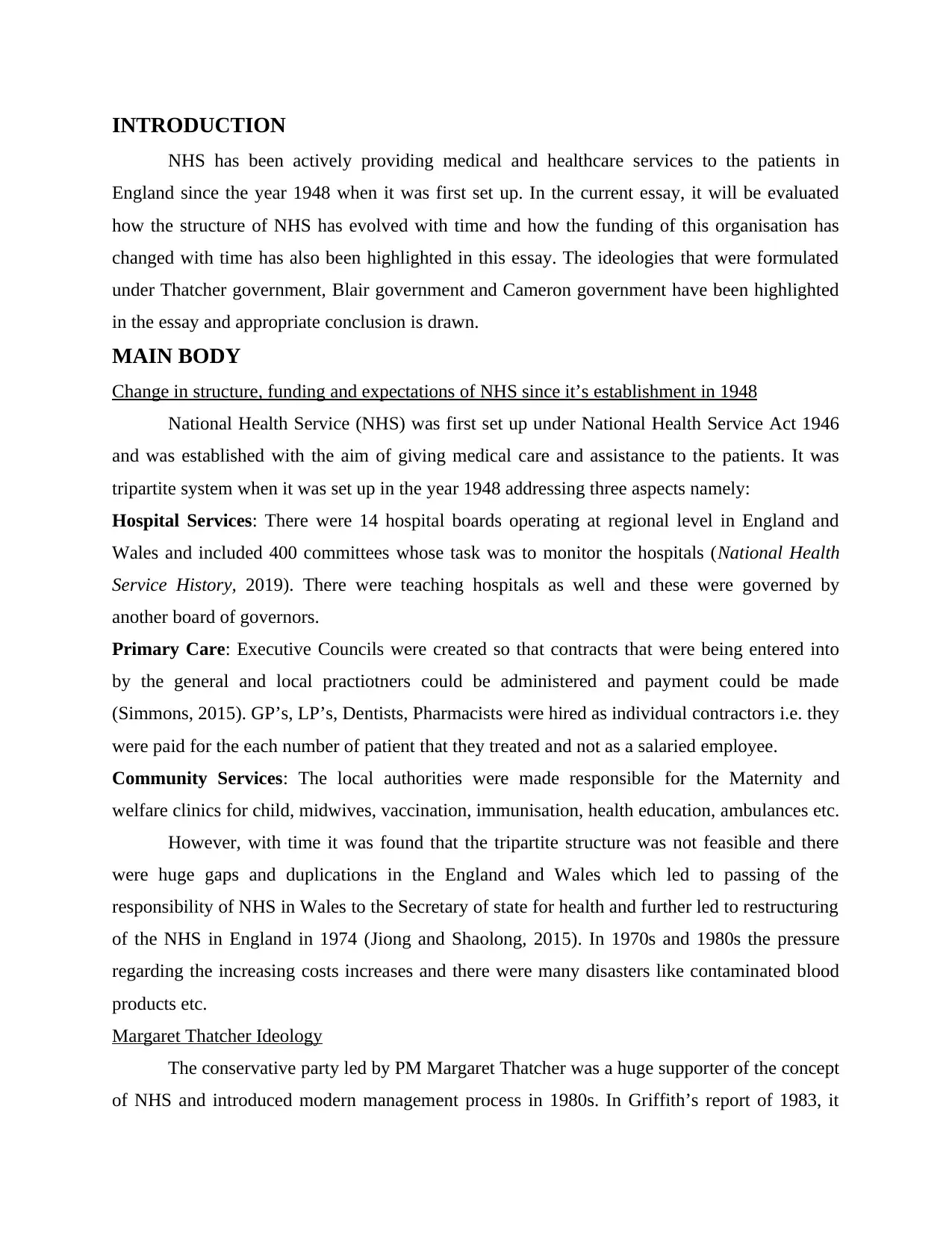
INTRODUCTION
NHS has been actively providing medical and healthcare services to the patients in
England since the year 1948 when it was first set up. In the current essay, it will be evaluated
how the structure of NHS has evolved with time and how the funding of this organisation has
changed with time has also been highlighted in this essay. The ideologies that were formulated
under Thatcher government, Blair government and Cameron government have been highlighted
in the essay and appropriate conclusion is drawn.
MAIN BODY
Change in structure, funding and expectations of NHS since it’s establishment in 1948
National Health Service (NHS) was first set up under National Health Service Act 1946
and was established with the aim of giving medical care and assistance to the patients. It was
tripartite system when it was set up in the year 1948 addressing three aspects namely:
Hospital Services: There were 14 hospital boards operating at regional level in England and
Wales and included 400 committees whose task was to monitor the hospitals (National Health
Service History, 2019). There were teaching hospitals as well and these were governed by
another board of governors.
Primary Care: Executive Councils were created so that contracts that were being entered into
by the general and local practiotners could be administered and payment could be made
(Simmons, 2015). GP’s, LP’s, Dentists, Pharmacists were hired as individual contractors i.e. they
were paid for the each number of patient that they treated and not as a salaried employee.
Community Services: The local authorities were made responsible for the Maternity and
welfare clinics for child, midwives, vaccination, immunisation, health education, ambulances etc.
However, with time it was found that the tripartite structure was not feasible and there
were huge gaps and duplications in the England and Wales which led to passing of the
responsibility of NHS in Wales to the Secretary of state for health and further led to restructuring
of the NHS in England in 1974 (Jiong and Shaolong, 2015). In 1970s and 1980s the pressure
regarding the increasing costs increases and there were many disasters like contaminated blood
products etc.
Margaret Thatcher Ideology
The conservative party led by PM Margaret Thatcher was a huge supporter of the concept
of NHS and introduced modern management process in 1980s. In Griffith’s report of 1983, it
NHS has been actively providing medical and healthcare services to the patients in
England since the year 1948 when it was first set up. In the current essay, it will be evaluated
how the structure of NHS has evolved with time and how the funding of this organisation has
changed with time has also been highlighted in this essay. The ideologies that were formulated
under Thatcher government, Blair government and Cameron government have been highlighted
in the essay and appropriate conclusion is drawn.
MAIN BODY
Change in structure, funding and expectations of NHS since it’s establishment in 1948
National Health Service (NHS) was first set up under National Health Service Act 1946
and was established with the aim of giving medical care and assistance to the patients. It was
tripartite system when it was set up in the year 1948 addressing three aspects namely:
Hospital Services: There were 14 hospital boards operating at regional level in England and
Wales and included 400 committees whose task was to monitor the hospitals (National Health
Service History, 2019). There were teaching hospitals as well and these were governed by
another board of governors.
Primary Care: Executive Councils were created so that contracts that were being entered into
by the general and local practiotners could be administered and payment could be made
(Simmons, 2015). GP’s, LP’s, Dentists, Pharmacists were hired as individual contractors i.e. they
were paid for the each number of patient that they treated and not as a salaried employee.
Community Services: The local authorities were made responsible for the Maternity and
welfare clinics for child, midwives, vaccination, immunisation, health education, ambulances etc.
However, with time it was found that the tripartite structure was not feasible and there
were huge gaps and duplications in the England and Wales which led to passing of the
responsibility of NHS in Wales to the Secretary of state for health and further led to restructuring
of the NHS in England in 1974 (Jiong and Shaolong, 2015). In 1970s and 1980s the pressure
regarding the increasing costs increases and there were many disasters like contaminated blood
products etc.
Margaret Thatcher Ideology
The conservative party led by PM Margaret Thatcher was a huge supporter of the concept
of NHS and introduced modern management process in 1980s. In Griffith’s report of 1983, it
⊘ This is a preview!⊘
Do you want full access?
Subscribe today to unlock all pages.

Trusted by 1+ million students worldwide
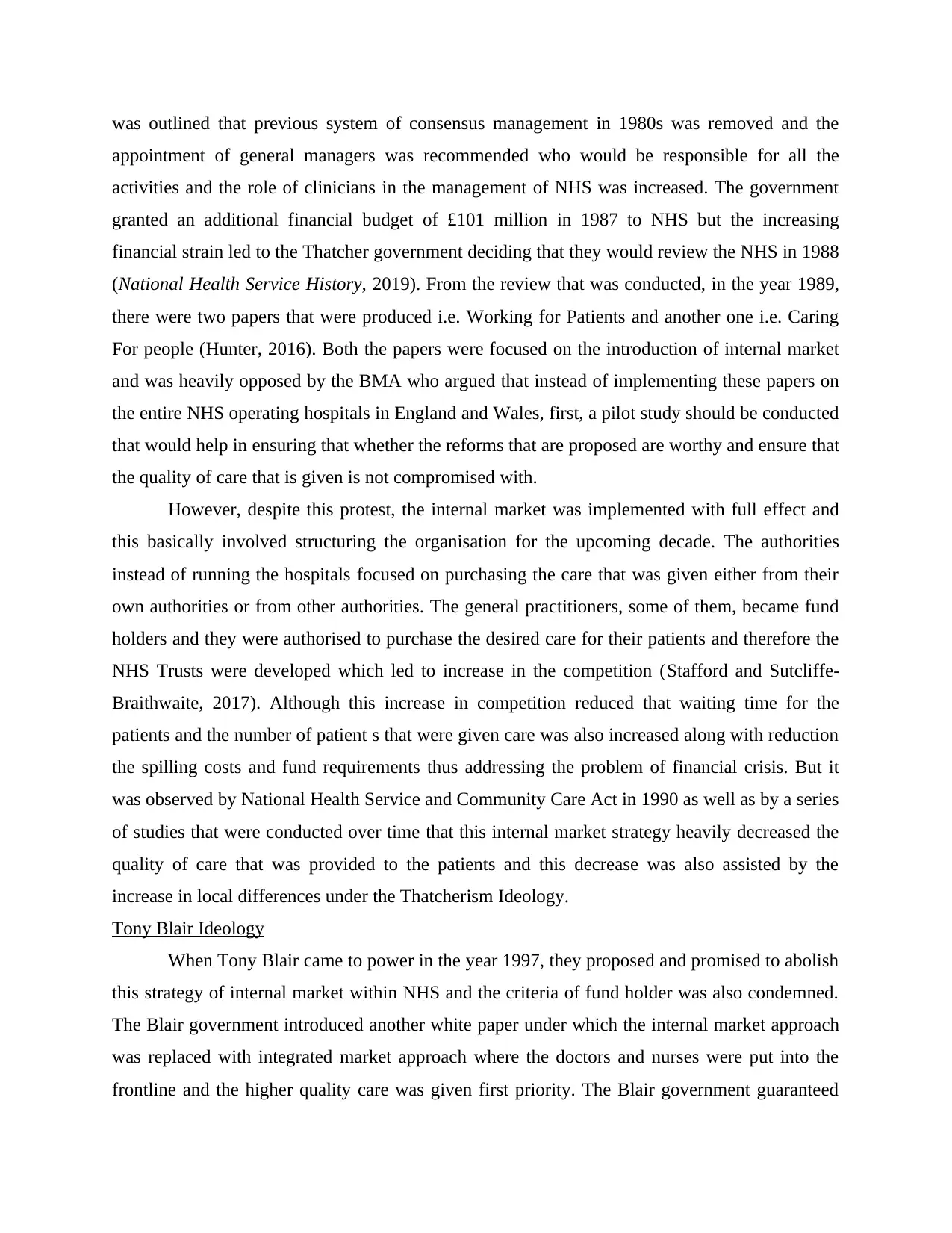
was outlined that previous system of consensus management in 1980s was removed and the
appointment of general managers was recommended who would be responsible for all the
activities and the role of clinicians in the management of NHS was increased. The government
granted an additional financial budget of £101 million in 1987 to NHS but the increasing
financial strain led to the Thatcher government deciding that they would review the NHS in 1988
(National Health Service History, 2019). From the review that was conducted, in the year 1989,
there were two papers that were produced i.e. Working for Patients and another one i.e. Caring
For people (Hunter, 2016). Both the papers were focused on the introduction of internal market
and was heavily opposed by the BMA who argued that instead of implementing these papers on
the entire NHS operating hospitals in England and Wales, first, a pilot study should be conducted
that would help in ensuring that whether the reforms that are proposed are worthy and ensure that
the quality of care that is given is not compromised with.
However, despite this protest, the internal market was implemented with full effect and
this basically involved structuring the organisation for the upcoming decade. The authorities
instead of running the hospitals focused on purchasing the care that was given either from their
own authorities or from other authorities. The general practitioners, some of them, became fund
holders and they were authorised to purchase the desired care for their patients and therefore the
NHS Trusts were developed which led to increase in the competition (Stafford and Sutcliffe-
Braithwaite, 2017). Although this increase in competition reduced that waiting time for the
patients and the number of patient s that were given care was also increased along with reduction
the spilling costs and fund requirements thus addressing the problem of financial crisis. But it
was observed by National Health Service and Community Care Act in 1990 as well as by a series
of studies that were conducted over time that this internal market strategy heavily decreased the
quality of care that was provided to the patients and this decrease was also assisted by the
increase in local differences under the Thatcherism Ideology.
Tony Blair Ideology
When Tony Blair came to power in the year 1997, they proposed and promised to abolish
this strategy of internal market within NHS and the criteria of fund holder was also condemned.
The Blair government introduced another white paper under which the internal market approach
was replaced with integrated market approach where the doctors and nurses were put into the
frontline and the higher quality care was given first priority. The Blair government guaranteed
appointment of general managers was recommended who would be responsible for all the
activities and the role of clinicians in the management of NHS was increased. The government
granted an additional financial budget of £101 million in 1987 to NHS but the increasing
financial strain led to the Thatcher government deciding that they would review the NHS in 1988
(National Health Service History, 2019). From the review that was conducted, in the year 1989,
there were two papers that were produced i.e. Working for Patients and another one i.e. Caring
For people (Hunter, 2016). Both the papers were focused on the introduction of internal market
and was heavily opposed by the BMA who argued that instead of implementing these papers on
the entire NHS operating hospitals in England and Wales, first, a pilot study should be conducted
that would help in ensuring that whether the reforms that are proposed are worthy and ensure that
the quality of care that is given is not compromised with.
However, despite this protest, the internal market was implemented with full effect and
this basically involved structuring the organisation for the upcoming decade. The authorities
instead of running the hospitals focused on purchasing the care that was given either from their
own authorities or from other authorities. The general practitioners, some of them, became fund
holders and they were authorised to purchase the desired care for their patients and therefore the
NHS Trusts were developed which led to increase in the competition (Stafford and Sutcliffe-
Braithwaite, 2017). Although this increase in competition reduced that waiting time for the
patients and the number of patient s that were given care was also increased along with reduction
the spilling costs and fund requirements thus addressing the problem of financial crisis. But it
was observed by National Health Service and Community Care Act in 1990 as well as by a series
of studies that were conducted over time that this internal market strategy heavily decreased the
quality of care that was provided to the patients and this decrease was also assisted by the
increase in local differences under the Thatcherism Ideology.
Tony Blair Ideology
When Tony Blair came to power in the year 1997, they proposed and promised to abolish
this strategy of internal market within NHS and the criteria of fund holder was also condemned.
The Blair government introduced another white paper under which the internal market approach
was replaced with integrated market approach where the doctors and nurses were put into the
frontline and the higher quality care was given first priority. The Blair government guaranteed
Paraphrase This Document
Need a fresh take? Get an instant paraphrase of this document with our AI Paraphraser
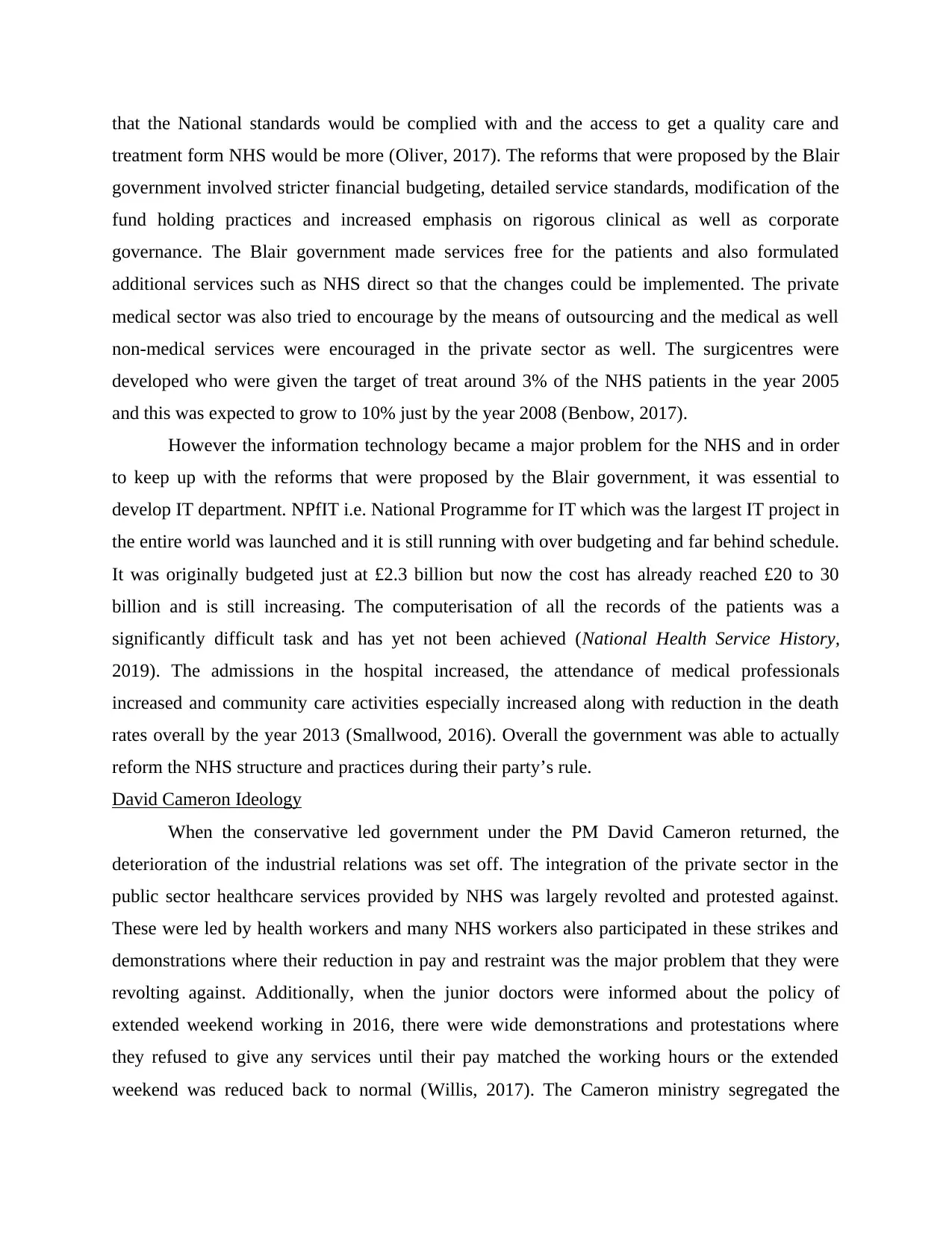
that the National standards would be complied with and the access to get a quality care and
treatment form NHS would be more (Oliver, 2017). The reforms that were proposed by the Blair
government involved stricter financial budgeting, detailed service standards, modification of the
fund holding practices and increased emphasis on rigorous clinical as well as corporate
governance. The Blair government made services free for the patients and also formulated
additional services such as NHS direct so that the changes could be implemented. The private
medical sector was also tried to encourage by the means of outsourcing and the medical as well
non-medical services were encouraged in the private sector as well. The surgicentres were
developed who were given the target of treat around 3% of the NHS patients in the year 2005
and this was expected to grow to 10% just by the year 2008 (Benbow, 2017).
However the information technology became a major problem for the NHS and in order
to keep up with the reforms that were proposed by the Blair government, it was essential to
develop IT department. NPfIT i.e. National Programme for IT which was the largest IT project in
the entire world was launched and it is still running with over budgeting and far behind schedule.
It was originally budgeted just at £2.3 billion but now the cost has already reached £20 to 30
billion and is still increasing. The computerisation of all the records of the patients was a
significantly difficult task and has yet not been achieved (National Health Service History,
2019). The admissions in the hospital increased, the attendance of medical professionals
increased and community care activities especially increased along with reduction in the death
rates overall by the year 2013 (Smallwood, 2016). Overall the government was able to actually
reform the NHS structure and practices during their party’s rule.
David Cameron Ideology
When the conservative led government under the PM David Cameron returned, the
deterioration of the industrial relations was set off. The integration of the private sector in the
public sector healthcare services provided by NHS was largely revolted and protested against.
These were led by health workers and many NHS workers also participated in these strikes and
demonstrations where their reduction in pay and restraint was the major problem that they were
revolting against. Additionally, when the junior doctors were informed about the policy of
extended weekend working in 2016, there were wide demonstrations and protestations where
they refused to give any services until their pay matched the working hours or the extended
weekend was reduced back to normal (Willis, 2017). The Cameron ministry segregated the
treatment form NHS would be more (Oliver, 2017). The reforms that were proposed by the Blair
government involved stricter financial budgeting, detailed service standards, modification of the
fund holding practices and increased emphasis on rigorous clinical as well as corporate
governance. The Blair government made services free for the patients and also formulated
additional services such as NHS direct so that the changes could be implemented. The private
medical sector was also tried to encourage by the means of outsourcing and the medical as well
non-medical services were encouraged in the private sector as well. The surgicentres were
developed who were given the target of treat around 3% of the NHS patients in the year 2005
and this was expected to grow to 10% just by the year 2008 (Benbow, 2017).
However the information technology became a major problem for the NHS and in order
to keep up with the reforms that were proposed by the Blair government, it was essential to
develop IT department. NPfIT i.e. National Programme for IT which was the largest IT project in
the entire world was launched and it is still running with over budgeting and far behind schedule.
It was originally budgeted just at £2.3 billion but now the cost has already reached £20 to 30
billion and is still increasing. The computerisation of all the records of the patients was a
significantly difficult task and has yet not been achieved (National Health Service History,
2019). The admissions in the hospital increased, the attendance of medical professionals
increased and community care activities especially increased along with reduction in the death
rates overall by the year 2013 (Smallwood, 2016). Overall the government was able to actually
reform the NHS structure and practices during their party’s rule.
David Cameron Ideology
When the conservative led government under the PM David Cameron returned, the
deterioration of the industrial relations was set off. The integration of the private sector in the
public sector healthcare services provided by NHS was largely revolted and protested against.
These were led by health workers and many NHS workers also participated in these strikes and
demonstrations where their reduction in pay and restraint was the major problem that they were
revolting against. Additionally, when the junior doctors were informed about the policy of
extended weekend working in 2016, there were wide demonstrations and protestations where
they refused to give any services until their pay matched the working hours or the extended
weekend was reduced back to normal (Willis, 2017). The Cameron ministry segregated the
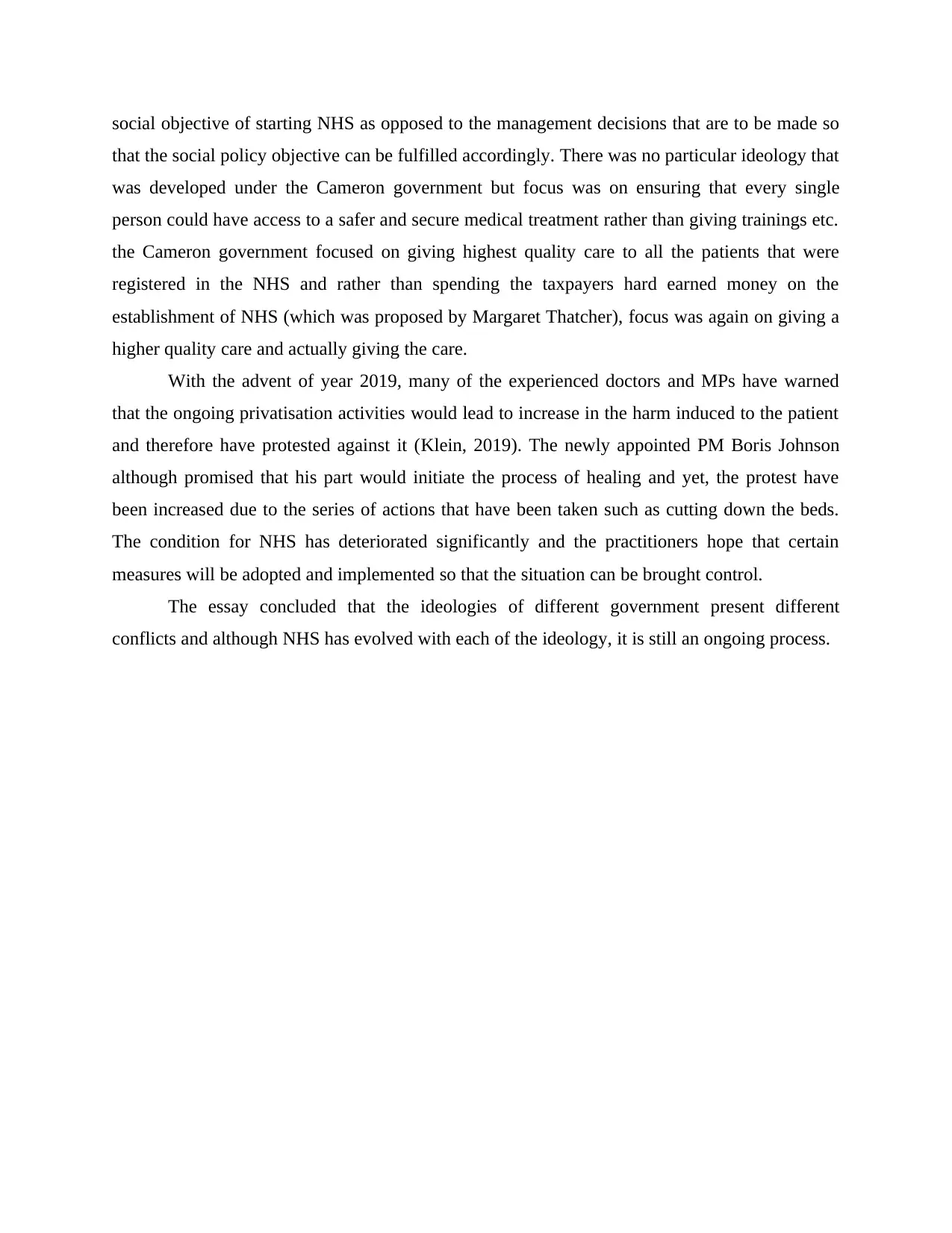
social objective of starting NHS as opposed to the management decisions that are to be made so
that the social policy objective can be fulfilled accordingly. There was no particular ideology that
was developed under the Cameron government but focus was on ensuring that every single
person could have access to a safer and secure medical treatment rather than giving trainings etc.
the Cameron government focused on giving highest quality care to all the patients that were
registered in the NHS and rather than spending the taxpayers hard earned money on the
establishment of NHS (which was proposed by Margaret Thatcher), focus was again on giving a
higher quality care and actually giving the care.
With the advent of year 2019, many of the experienced doctors and MPs have warned
that the ongoing privatisation activities would lead to increase in the harm induced to the patient
and therefore have protested against it (Klein, 2019). The newly appointed PM Boris Johnson
although promised that his part would initiate the process of healing and yet, the protest have
been increased due to the series of actions that have been taken such as cutting down the beds.
The condition for NHS has deteriorated significantly and the practitioners hope that certain
measures will be adopted and implemented so that the situation can be brought control.
The essay concluded that the ideologies of different government present different
conflicts and although NHS has evolved with each of the ideology, it is still an ongoing process.
that the social policy objective can be fulfilled accordingly. There was no particular ideology that
was developed under the Cameron government but focus was on ensuring that every single
person could have access to a safer and secure medical treatment rather than giving trainings etc.
the Cameron government focused on giving highest quality care to all the patients that were
registered in the NHS and rather than spending the taxpayers hard earned money on the
establishment of NHS (which was proposed by Margaret Thatcher), focus was again on giving a
higher quality care and actually giving the care.
With the advent of year 2019, many of the experienced doctors and MPs have warned
that the ongoing privatisation activities would lead to increase in the harm induced to the patient
and therefore have protested against it (Klein, 2019). The newly appointed PM Boris Johnson
although promised that his part would initiate the process of healing and yet, the protest have
been increased due to the series of actions that have been taken such as cutting down the beds.
The condition for NHS has deteriorated significantly and the practitioners hope that certain
measures will be adopted and implemented so that the situation can be brought control.
The essay concluded that the ideologies of different government present different
conflicts and although NHS has evolved with each of the ideology, it is still an ongoing process.
⊘ This is a preview!⊘
Do you want full access?
Subscribe today to unlock all pages.

Trusted by 1+ million students worldwide
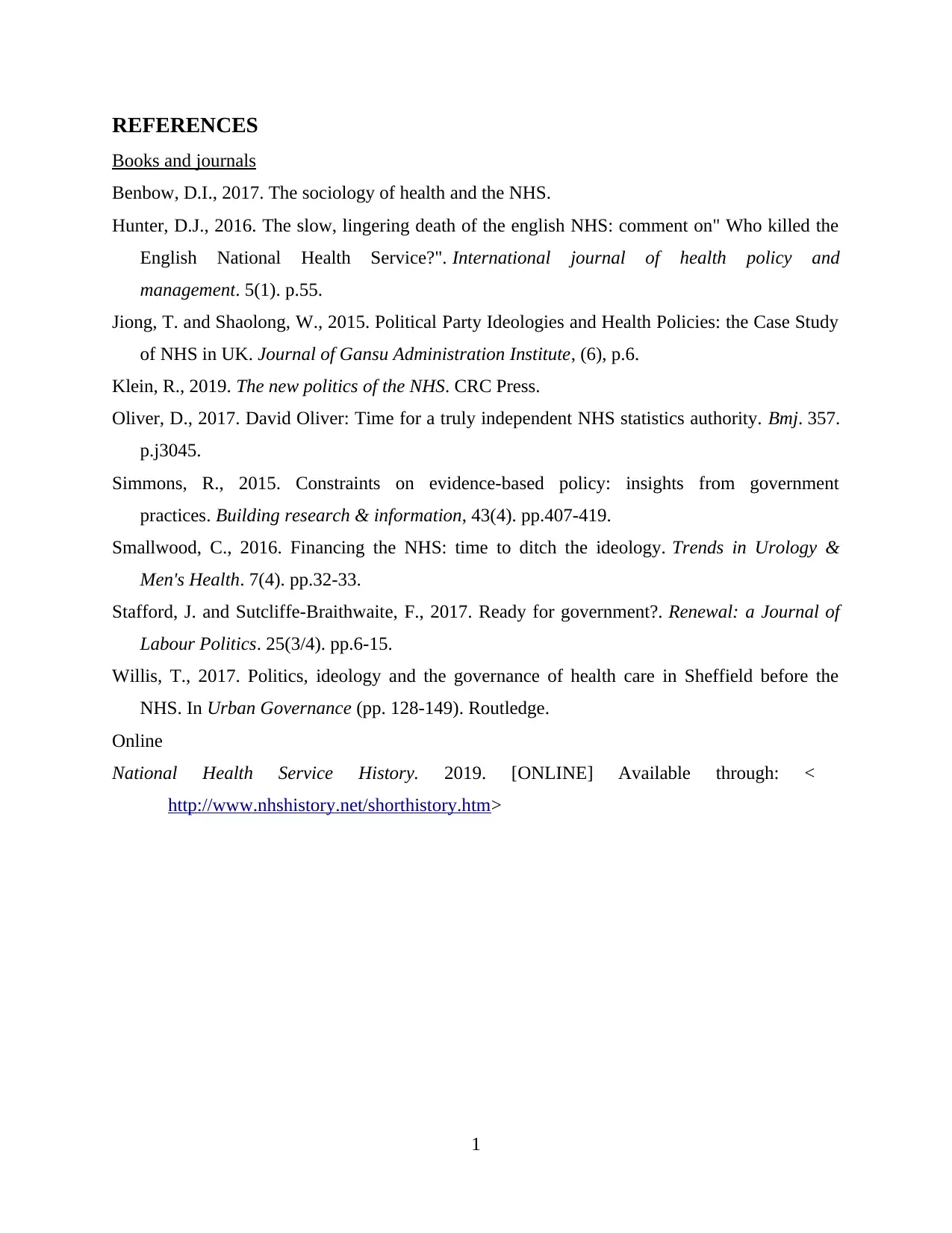
REFERENCES
Books and journals
Benbow, D.I., 2017. The sociology of health and the NHS.
Hunter, D.J., 2016. The slow, lingering death of the english NHS: comment on" Who killed the
English National Health Service?". International journal of health policy and
management. 5(1). p.55.
Jiong, T. and Shaolong, W., 2015. Political Party Ideologies and Health Policies: the Case Study
of NHS in UK. Journal of Gansu Administration Institute, (6), p.6.
Klein, R., 2019. The new politics of the NHS. CRC Press.
Oliver, D., 2017. David Oliver: Time for a truly independent NHS statistics authority. Bmj. 357.
p.j3045.
Simmons, R., 2015. Constraints on evidence-based policy: insights from government
practices. Building research & information, 43(4). pp.407-419.
Smallwood, C., 2016. Financing the NHS: time to ditch the ideology. Trends in Urology &
Men's Health. 7(4). pp.32-33.
Stafford, J. and Sutcliffe-Braithwaite, F., 2017. Ready for government?. Renewal: a Journal of
Labour Politics. 25(3/4). pp.6-15.
Willis, T., 2017. Politics, ideology and the governance of health care in Sheffield before the
NHS. In Urban Governance (pp. 128-149). Routledge.
Online
National Health Service History. 2019. [ONLINE] Available through: <
http://www.nhshistory.net/shorthistory.htm>
1
Books and journals
Benbow, D.I., 2017. The sociology of health and the NHS.
Hunter, D.J., 2016. The slow, lingering death of the english NHS: comment on" Who killed the
English National Health Service?". International journal of health policy and
management. 5(1). p.55.
Jiong, T. and Shaolong, W., 2015. Political Party Ideologies and Health Policies: the Case Study
of NHS in UK. Journal of Gansu Administration Institute, (6), p.6.
Klein, R., 2019. The new politics of the NHS. CRC Press.
Oliver, D., 2017. David Oliver: Time for a truly independent NHS statistics authority. Bmj. 357.
p.j3045.
Simmons, R., 2015. Constraints on evidence-based policy: insights from government
practices. Building research & information, 43(4). pp.407-419.
Smallwood, C., 2016. Financing the NHS: time to ditch the ideology. Trends in Urology &
Men's Health. 7(4). pp.32-33.
Stafford, J. and Sutcliffe-Braithwaite, F., 2017. Ready for government?. Renewal: a Journal of
Labour Politics. 25(3/4). pp.6-15.
Willis, T., 2017. Politics, ideology and the governance of health care in Sheffield before the
NHS. In Urban Governance (pp. 128-149). Routledge.
Online
National Health Service History. 2019. [ONLINE] Available through: <
http://www.nhshistory.net/shorthistory.htm>
1
Paraphrase This Document
Need a fresh take? Get an instant paraphrase of this document with our AI Paraphraser

2
1 out of 8
Related Documents
Your All-in-One AI-Powered Toolkit for Academic Success.
+13062052269
info@desklib.com
Available 24*7 on WhatsApp / Email
![[object Object]](/_next/static/media/star-bottom.7253800d.svg)
Unlock your academic potential
Copyright © 2020–2026 A2Z Services. All Rights Reserved. Developed and managed by ZUCOL.





